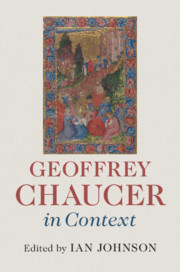Book contents
- Geoffrey Chaucer in Context
- Geoffrey Chaucer in Context
- Copyright page
- Contents
- Illustrations
- Contributors
- Abbreviations
- Introduction
- Part I Chaucer as Context
- Part II Books, Discourse and Traditions
- Part III Humans, the World and Beyond
- Chapter 19 Chaucer’s God
- Chapter 20 Holiness
- Chapter 21 Secularity
- Chapter 22 The Self
- Chapter 23 Women
- Chapter 24 Sex and Lust
- Chapter 25 Animals in Chaucer
- Part IV Culture, Learning and Disciplines
- Part V Political and Social Contexts
- Part VI Chaucer Traditions
- Further Reading
- Index
Chapter 21 - Secularity
from Part III - Humans, the World and Beyond
Published online by Cambridge University Press: 24 June 2019
- Geoffrey Chaucer in Context
- Geoffrey Chaucer in Context
- Copyright page
- Contents
- Illustrations
- Contributors
- Abbreviations
- Introduction
- Part I Chaucer as Context
- Part II Books, Discourse and Traditions
- Part III Humans, the World and Beyond
- Chapter 19 Chaucer’s God
- Chapter 20 Holiness
- Chapter 21 Secularity
- Chapter 22 The Self
- Chapter 23 Women
- Chapter 24 Sex and Lust
- Chapter 25 Animals in Chaucer
- Part IV Culture, Learning and Disciplines
- Part V Political and Social Contexts
- Part VI Chaucer Traditions
- Further Reading
- Index
Summary
‘Secularity’ is here taken to involve matters which are lay and earthly as opposed to otherworldly and spiritual. Personal experience was being allowed its own authority, a principle which often features in Chaucer’s poetry, as when he portrays a woman with much experience of marriage and a marquis who obsessively tests his wife’s virtue. Certain marvels were acknowledged to have natural rather than miraculous causes; this belief features in the tales told by the Squire and Franklin. Chaucer condemns false alchemists who dupe victims into believing that they are seeing precious metals being created. As far as astrology/astronomy is concerned, he makes use of secular science whilst disassociating himself from the pagan beliefs held by its ancient proponents. His sociopolitical values often reflect those associated with recently recovered works by Aristotle. Secularity and religiosity were not invariably in opposition, but sometimes the strains showed – as in Chaucer’s Retractions.
- Type
- Chapter
- Information
- Geoffrey Chaucer in Context , pp. 178 - 186Publisher: Cambridge University PressPrint publication year: 2019

